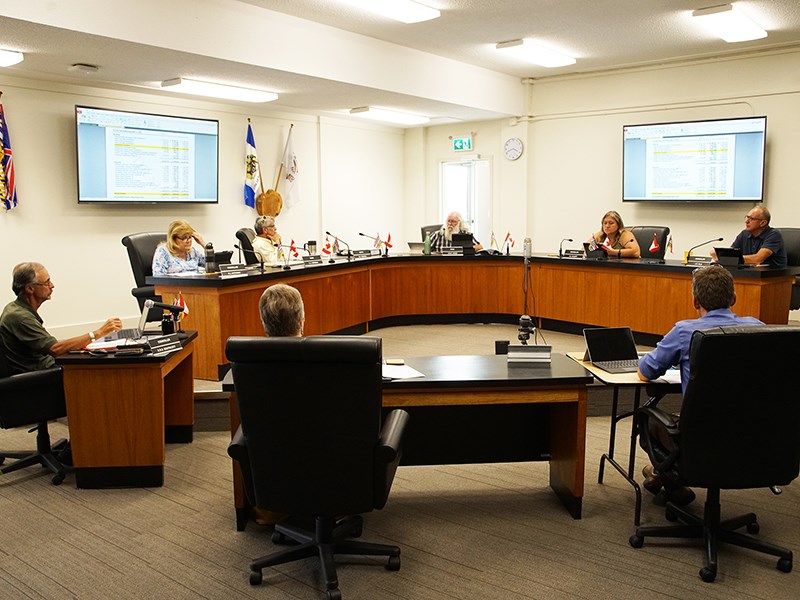Permissive tax exemptions in the City of Powell River will be undergoing a review.
At the July 23 finance committee meeting, chief financial officer Adam Langenmaier said he had presented a written report to the finance committee regarding permissive tax exemptions (PTE) and it was not easy to write. He said it impacts a lot of services provided to the community.
The Community Charter allows municipalities to grant permissive tax exemptions, which means the city may not charge taxes on certain properties if certain criteria are met.
“What we are looking at are different methods and strategies of adjusting how the policies regarding permissive tax exemptions are granted to different groups,” said Langenmaier. “Currently, the policy is fairly broad and there are very few times when there is anything but a 100 per cent exemption granted by council, or the recommendation made to council for a 100 per cent exemption.”
According to Langenmaier’s report, the 2019 permissive tax exemption bylaw granted a total of $346,142 of property tax exemptions for 2020 to all 62 applicants, representing 1.9 per cent of the 2019 general municipal taxation.
Langenmaier said he looked at other municipalities and how they treat permissive tax exemptions. One method used is capping the value.
Langenmaier said the city’s estimated 2021 PTEs as a function of total tax revenue is expected to be $466,138, which is 2.51 per cent of the total tax revenue.
“Council could say it wants to tie the total amount of exemptions to a fixed number,” said Langenmaier. “A number of municipalities tie permissive tax exemptions to a percentage of the total tax base. You could say PTEs could be capped at two per cent of our municipal taxation and that way it will grow and change with overall taxation as opposed to capping the value, which doesn’t adjust for inflation.”
Another method is limiting exemptions to the service category. He said when looking at PTE applications received, in his report, he broke them down into basic groupings, which applies different exemption amounts. An example would be for community halls, the exemption might be 75 per cent of the tax bill. A social program might be eligible for 100 per cent exemption, said Langenmaier.
“This method will still reduce the total cost of the property tax exemption but it still doesn’t give us a cap,” he added.
Another method would be to take the two methods and combine them, having a cap and exemptions by category.
Langenmaier said the financial impact regarding the prospect of adjusting PTEs is up to council. He said under the current system, the city is looking at more than it was in years past.
Mayor Dave Formosa said he thinks the answer is a combination of the factors outlined. He said in Langenmaier’s report, he showed examples of communities such as Port Alberni, Parksville, Campbell River and Courtenay, that cap the value of PTEs. He asked Langenmaier if he found many communities, such as Powell River, that do not cap PTEs.
Langenmaier said there are a number of communities that don’t cap. He added that there is no best method for capping PTEs and it’s really up to council’s discretion.
Formosa said he liked the cap idea.
Councillor Maggie Hathaway said she liked limiting exemptions by categories, giving 100 per cent to organizations most in need, and adjusting from there.
Finance committee chair councillor George Doubt said council has asked the newly formed community finance advisory committee for advice on the PTE policy. He said that committee recently held its first meeting and brought up whether it might like to address that question first. Doubt said there was some enthusiasm for dealing with PTEs as a good place to start.
“It’s possible for council to refer this so council can get advice from the community finance advisory committee on where they think council might want to go,” said Doubt. “It would be a great task for the committee to get its teeth into and provide some advice.”
Councillor Jim Palm said even though the matter could be going to the new finance advisory committee, that council be proactive and issue some kind of media release to all organizations seeking PTEs so they are fully aware they might have a tax bill in the coming year.
“I don’t think we just spring it on them without notice,” said Palm. “We should be formally addressing this.”
Formosa said it was a good idea to do that but it has to be communicated well so there is not “absolute panic” from the societies. He said sending out Langenmaier’s report might do a good job of showing the options the city would be looking at.
“It’s a good idea that we warn them, and carefully, so that we don’t cause angst,” said Formosa. “We’re looking at it. It’s not a done deal.”
Doubt suggested council defer a decision on PTEs and that it ask the advice of the community advisory finance committee about where to go in the meantime. The finance committee agreed with the direction.



